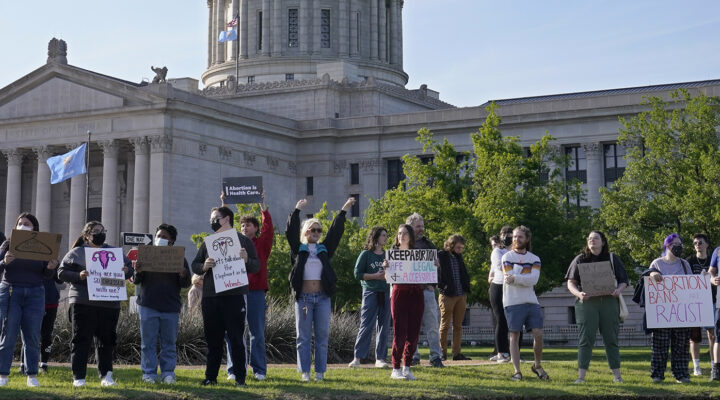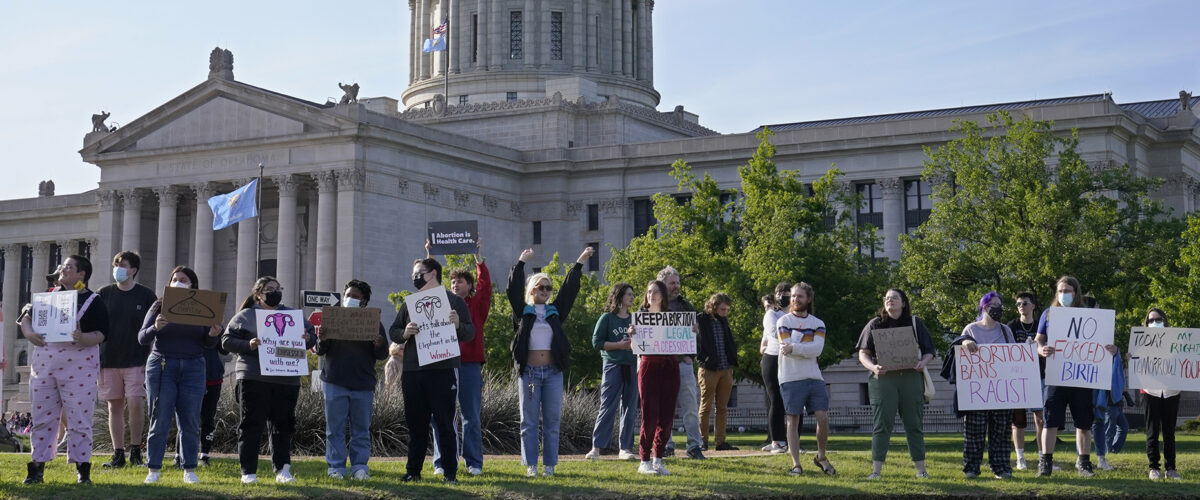Oklahoma legislators appear to know the exact answer to a question that has vexed doctors and theologians for centuries: When does life begin?
According to a controversial bill adopted by the Oklahoma Legislature May 19, life begins at fertilization.
“If signed into law, Oklahoma’s new bill will be the first state law passed that explicitly defines an ‘unborn child’ as present at conception, a key goal for proponents of ‘fetal personhood,’ according to Chrissy Stroop, a prominent ex-evangelical writer, speaker and advocate.
Writing for Religion Dispatches, she said Oklahoma legislators “aren’t even trying to hide the religious motivations for their actions, which would certainly make them unconstitutional under any reasonable interpretation of the Establishment Clause of the First Amendment.”
She quotes Oklahoma Gov. Kevin Stitt saying on Fox News: “We believe that God has a special plan for every single life and every single child, and we want everybody to have the same opportunities in Oklahoma, and aborting a child is not the right answer.”
“We believe that God has a special plan for every single life and every single child.”
The state’s heavily Republican legislature handily adopted House Bill 4327 by a vote of 35 to 20 in the Senate and 73 to 16 in the House. The bill originated with first-term state Rep. Wendy Stearman of the Tulsa area and state Sen. Julie Daniels of Bartlesville.
When signed into law by the governor — which is widely expected any moment — Oklahoma will have the strictest, and opponents say most cruel, anti-abortion law in the nation. The bill draws inspiration from legislation passed in other states but is unique in defining “fertilization” as the point when fetal life must be protected.
Texas and other states have passed so-called “fetal heartbeat” bills that prohibit abortions after a heartbeat is detected — a controversial term itself because of disagreements between pro-life advocates and medical scholars about what constitutes a heartbeat. Those bills are believed to restrict abortion after about six weeks of pregnancy. Oklahoma already had one of those laws, signed by the governor just two weeks ago.
But in light of the leaked majority opinion draft from Supreme Court Justice Samuel Alito that presages the evisceration of Roe v. Wade, Republican-controlled legislatures across the country are growing more aggressive. The new Oklahoma law could not stand under the legal scrutiny of Roe but legislators appear to believe that no longer will be a barrier.
The new Oklahoma law also mirrors a new Texas law that places enforcement of the abortion ban on individual citizens who are encouraged to report violators and receive a $10,000 bounty.
What’s most unusual about the Oklahoma bill, however, is this definition: “’Unborn child’ means a human fetus or embryo in any stage of gestation from fertilization until birth.”
“’Unborn child’ means a human fetus or embryo in any stage of gestation from fertilization until birth.”
While the staunchest of evangelical anti-abortion advocates and official Roman Catholic doctrine see “life” beginning at “conception,” this view is not shared among the world’s religious faithful. Judaism consider life to begin with breath, for example. And many mainline and progressive Christians share the view of the 1973 U.S. Supreme Court that there is some point of “viability” beyond which an unborn child might be considered a person.
“Fertilization” is considered the earliest beginnings of a pregnancy, when a man’s sperm meets a woman’ egg in the fallopian tube, eventually migrating to the uterus, when in a successful pregnancy the fertilized egg implants itself into the uterine wall.
There are several exceptions to the otherwise strict language of the Oklahoma bill:
- It allows for the use of the Plan B pill, a widely used form of emergency contraception, but prohibits medical abortions using pills.
- It exempts any procedure necessary to “save the life or preserve the health of the unborn child,” to “remove a dead unborn child caused by spontaneous abortion” or to remove an ectopic pregnancy.
- It makes exceptions for abortion when “necessary to save the life of a pregnant woman in a medical emergency” or if the pregnancy is the result of rape, sexual assault or incest that has been reported to law enforcement. The “fetal heartbeat” bill signed into law two weeks ago does not include exceptions for cases of rape and incest.
- It says a lawsuit cannot be brought against a woman who had or seeks to have an abortion. Some of the most extreme voices in the evangelical anti-abortion community, including some Southern Baptists, believe women who have an abortion should be prosecuted for capital murder.
Otherwise, the bill targets anyone who “performs or induces” an abortion; who “knowingly engages in conduct that aids or abets the performance or inducement of an abortion”; anyone who pays for the above; and anyone who “intends to engage” in either of the above.
Immediately, Planned Parenthood pledged to sue the state of Oklahoma over the legislation if signed by the governor.
“The Oklahoma legislature just passed a total ban on abortion, enforced by private citizens,” the group tweeted. “This ban will take effect as soon as the governor signs the bill, making Oklahoma the first state to outlaw abortion entirely — even while Roe v. Wade still stands.”
Despite the carveouts previously noted, critics of the bill had many questions, especially about in vitro fertilization, where multiple eggs and sperm may be joined in hopes of helping infertile women give birth.
Stroop also added this question: “While the Oklahoma law states it does not apply to birth control, the twisted logic of ‘fetal personhood’ ultimately cannot coexist with access to some IUDs, which, in addition to preventing fertilization, can prevent implantation of fertilized eggs, and very likely Plan B (despite the fact that, contrary to popular belief, it does not work by preventing the implantation of fertilized eggs). And there is no reason to believe that birth control won’t be tackled in separate bills. Indeed, right-wingers are already strategizing about possible contraception bans. The horrors playing out in Oklahoma are only the beginning of the fascist onslaught to come.”
By the end of the day Thursday, the National Right to Life Committee — one of the nation’s most prominent anti-abortion groups — had not issued any statement about the Oklahoma bill. In fact, almost all the publicly visible chatter on social media was from opponents of the Oklahoma bill.
Related articles:
Roe v. Wade, the great divider | Analysis by Erich Bridges
Why I’m a pro-choice Christian and believe you should be too | Opinion by Laura Ellis
Letter to the Editor: A response to Laura Ellis on abortion and Christian Realism


